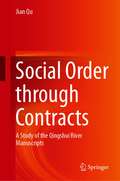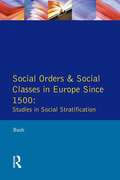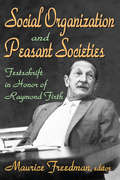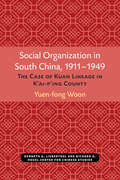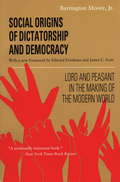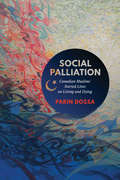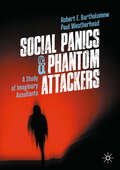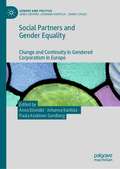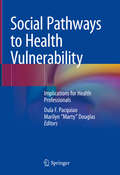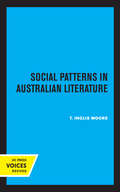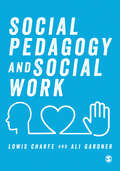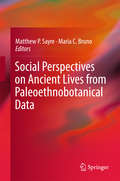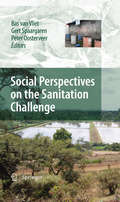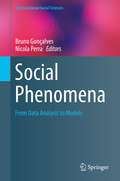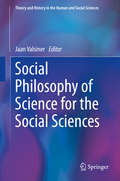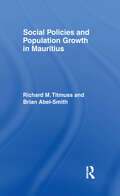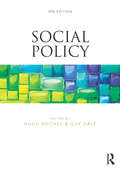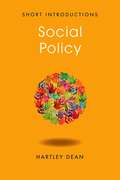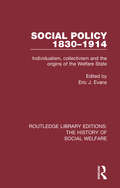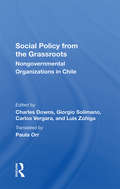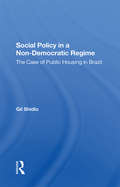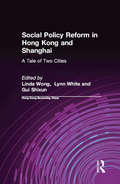- Table View
- List View
Social Order through Contracts: A Study of the Qingshui River Manuscripts
by Jian QuThis book is the first Western-language monograph on the study of the Qingshui River manuscripts. By examining over 3,000 contracts and other manuscripts, this book offers constructive insights into the long-standing question of how and why a society in late imperial China could maintain a well-functioning social system with few laws but many contracts, i.e., Hobbesian “words without sword.” Three interrelated questions, what contracts were, how and why they worked, are explained successively. Thus, this book presents a non-stereotypical “contract society” in southwest China, arguing that the social order which provides predictability and regularity for economic prosperity could be formed and maintained through contracts even under the condition of relatively weak influence of governmental and legal authorities.This book benefits readers who are interested in law, society, and history. While presenting the socio-legal landscape of a frontier area in late imperial China for historians, this book provides a novel and empirical interpretation of the supposedly well-known contract device for legal researchers, thereby proposing materials for an integrated theoretical explanatory framework of contracts in general. By employing the innovative theory of blockchain in its key argumentation, the book offers a creative interpretation of historical and social phenomena.
Social Orders and Social Classes in Europe Since 1500: Studies in Social Stratification
by M. L. BushThis pioneering survey evaluates the notions of class and order throughout European history since 1500. After a general theoretical section on the concept of orders and class, the book provides discussions and case studies of the nobility, the clergy, the middle classes and the rural and urban proletariat. The studies are drawn from all over Europe, from early modern Castile to late Tsarist Russia. Contributors include Peter Burke, Stuart Woolf, A A Thompson and Joseph Bergin.
Social Organization and Peasant Societies: Festschrift in Honor of Raymond Firth
by Maurice FreedmanThe essays included in Social Organization and Peasant Societies were written in honor of the man who taught their authors. Each entry is about different problems within the general field of "social organization."They were composed in many styles; and deal ethnographically with a heterogeneous collection of peoples and countries. Together they illustrate an important aspect of Firth's influence as a teacher: the range of his interests and his success in promoting social anthropological research on the broadest front.The breadth and the variety in the work of his students reflect Firth's own catholicity. From economics he reached into every corner of the field covered by social anthropology, and many of his interests can be traced in these essays on themes in kinship and marriage (by Baric, Benedict, Kaberry, and Leach) and on religious subjects (by Freedman, Morris, and Stanner). Still more detail the study of modern social change (by Little and Mayer). There is even one is on art (by Forge). Three are devoted to subjects in economic anthropology (by Belshaw, Swift, and Ward). On all of these varied and complex topics Raymond Firth has written extensively and taught untiringly. Many of the contributors to his festschrift are themselves leading anthropologists.Raymond Firth's importance in the history of social anthropology is undisputed. He came into the profession when it was small and unformed, when it existed only in the tiny groups of people around Malinowski and Radcliffe-Brown. He urged it on, by intellectual leadership, by careful organization, and by devoted service. He was one of a small band of scholars; he created a large school. He inherited an esoteric seminar from Malinowski; he turned it into a great class where, over the years, hundreds of students marveled at his skill and learned their craft as analysts and field workers. His protege listened to his formulation of problems, his critique of methods, and his courteous but un
Social Organization in South China, 1911–1949: The Case of Kuan Lineage in K’ai-p’ing County (Michigan Monographs In Chinese Studies #48)
by Yuen-Fong WoonBridging the collapse of the Confucian state and the establishment of the People’s Republic of China, the period 1911–49 is particularly fascinating to historians, anthropologists, sociologists and political scientists. Unfortunately, it is also a very confusing period, full of shifts and changes in economic, social, and political organizations. The social implications of these changes, and the relationships between officials on the subdistrict level, the unofficial leaders, and the bulk of the peasantry remain inadequately known. South China, which nurtured the Communist Party in its formative years, is a particularly interesting case. In this study I use the Kuan lineage of K’ai-p’ing as a case study to show the effects of demographic, economic, administrative, and educational changes after the Treaty of Nanking (1842) on patrilineal kinship as a principle of social organization in South China. [vii]
Social Origins of Dictatorship and Democracy
by Barrington Moore Jr.A landmark in comparative history and a challenge to scholars of all lands who are trying to learn how we arrived at where we are now. "-New York Times Book Review""
Social Palliation: Canadian Muslims’ Storied Lives on Living and Dying (G - Reference,information And Interdisciplinary Subjects Ser.)
by Parin DossaSocial Palliation is a pioneering study on living and dying as articulated by first-generation Iranian and Ismaili Muslim communities in Canada. Using ethnographic narratives, Parin Dossa makes a case for a paradigm shift from palliative care to social palliation. Experiences of displacement and resettlement reveal that life and death must be understood as an integrated unit if we are to appreciate what it is like to be awakened to our human existence. In the wake of structural exclusion and systemic suffering, social palliation brings to light displaced persons’ endeavours to restore the integrity of life and death. Dossa highlights the point that death conjoined with life is embedded within the socio-cultural and spiritual experience. Here, a caring society is not perceived in fragments, as is the case with traditional institutional care or care offered during end-of-life. Rather, Dossa draws attention to an organic form of caring, illustrated through the trajectories of storied lives. In exemplifying more humane aspects of social palliation, this book foregrounds sacred traditions to illustrate their potential to evoke deep-level conversations across socio-political boundaries on what it is like to live and die in the contemporary world.
Social Panics & Phantom Attackers: A Study of Imaginary Assailants
by Robert E. Bartholomew Paul WeatherheadThis book provides an accessible overview of one particular type of social panic: that of the phantom attacker. Such panics are characterised by outbreaks of sensational claims of attacks by mysterious figures that seem to emerge from nowhere, attack their innocent human and animal victims, only to vanish without a trace. Taking the recent wave of needle-spiking reports in Europe as a starting point, this book does more than just catalogue such outbreaks historically and geographically. It also ties the phenomenon of phantom assailants to the moral panics literature. Meticulously investigating archival sources, the authors examine the social construction of social panics and unearth the parallels between contemporary episodes and historical antecedents in Europe, North America, Asia and Africa. Focusing on the sociohistorical and -cultural context, they uncover the role of mass media in creating and perpetuating these panics, which respond to anxieties pervading societies at particular points in history. Written in a lively style, this book is not only of interest for scholars and students of sociology, criminology, social psychology, media studies and history but also appeals to a lay audience interested in urban legends and true crime.
Social Partners and Gender Equality: Change and Continuity in Gendered Corporatism in Europe (Gender and Politics)
by Johanna Kantola Anna Elomäki Paula Koskinen SandbergThis book breaks new ground in gender and politics research by studying the multiple ways in which gender and intersectional equalities shape and are shaped by social partners representing employers and employees in Europe, as well as the relationships between those social partners. Little critical attention has been paid to these organizations, yet, as this volume illustrates, social partners are important actors in relation to gender and other inequalities at the level of both individual European countries and the European Union. The chapters in this volume explore the impact of social partners on (in)equalities in a variety of 21st-century political contexts, taking into account phenomena such as neoliberalisation, austerity, and the COVID-19 crisis. This volume adds a crucial dimension to studies on gender inequalities in the labour market, contributing to research on issues such as domestic work, the gender pay gap, and the persistent undervaluation of women’s labour and feminized reproductive labour, in particular care work. It also represents a significant contribution to the literature on gender equality policy. The book’s focus on social partners provides important insights that help to explain the persistence of gender inequalities and the difficulties of adopting and implementing policies to combat them. This volume should appeal to students and researchers of gender studies, politics, European politics, employment relations, and international relations, as well as to policymakers engaged in addressing gender inequalities in the labour market.
Social Pathways to Health Vulnerability: Implications for Health Professionals
by Marilyn Marty" Douglas Dula F. PacquiaoPrimarily intended for DNP and PhD students in nursing and health care who are expected to design research to identify health-related problems and solutions, this book focuses on the concepts, theories and processes of how social determinants affect the health of populations. Using specific social determinants as an organizing framework, it presents ample scientific evidence from health and social disciplines of the universal processes that produce the social patterning of health inequities. This book is organized into three major parts, beginning with the social pathways to health vulnerability, followed by research methods and subsequently frameworks for action. The methods section provides selected research approaches suitable for studying the impact of social variables on population health, as well as the outcomes of multilevel interventions. Each chapter provides an in-depth presentation of relevant theoretical knowledge and research-based examples of work conducted in the area. The book addresses the specific implications for health professional leaders such as nurses or health policy makers, highlighting their role in achieving macrosocial changes to promote health among specific vulnerable populations. Both of the book’s editors are prominent and highly respected scholars in their field. The team of authors is highly multidisciplinary, including experts from the fields of medicine, public health, education and epidemiology who have conducted research on the social determinants of population health. Combining their varied perspectives, this book offers a valuable resource for graduate students (PhD, MD, DNP, MSN, etc.), faculty, researchers and clinicians in health professions.
Social Patterns in Australian Literature
by T. Inglis MooreThis title is part of UC Press's Voices Revived program, which commemorates University of California Press’s mission to seek out and cultivate the brightest minds and give them voice, reach, and impact. Drawing on a backlist dating to 1893, Voices Revived makes high-quality, peer-reviewed scholarship accessible once again using print-on-demand technology. This title was originally published in 1971.
Social Pedagogy and Social Work
by Ali Gardner Lowis CharfeAre you looking to understand more about social pedagogy? Wanting to see how you can incorporate these approaches into your practice? Ali Gardner and Lowis Charfe introduce you to this exciting new approach to UK social work practice that has been shaping care services in Europe for decades. It is a holistic approach that requires an absolute commitment to employing your heard, heart, and hand in creatively working alongside individuals to support the process of change at an individual, communal, and societal level. - The authors outline the key concepts, philosophy, and history of social pedagogy to ground you in the theory - Exercises help you to reflect on how to incorporate this new philosophy into your work - Practical examples demonstrate how you can apply key principles to your own practice After reading this book you will be able to confidently engage with social work that emphasises people rather than processes at the heart of intervention.
Social Pedagogy and Social Work
by Ali Gardner Lowis CharfeAre you looking to understand more about social pedagogy? Wanting to see how you can incorporate these approaches into your practice? Ali Gardner and Lowis Charfe introduce you to this exciting new approach to UK social work practice that has been shaping care services in Europe for decades. It is a holistic approach that requires an absolute commitment to employing your head, heart, and hand in creatively working alongside individuals to support the process of change at an individual, communal, and societal level. The authors outline the key concepts, philosophy, and history of social pedagogy to ground you in the theory Exercises help you to reflect on how to incorporate this new philosophy into your work Practical examples demonstrate how you can apply key principles to your own practice After reading this book you will be able to confidently engage with social work that emphasises people rather than processes at the heart of intervention.
Social Perspectives on Ancient Lives from Paleothnobotanical Data
by Matthew P. Sayre Maria C. BrunoThis volume contributes to the emerging topic of social paleoethnobotany with a series of papers exploring dynamic aspects of past social life, particularly the day-to-day practices and politics of procuring, preparing, and consuming plants. The contributors to this volume illustrate how one can bridge differences between the natural and social sciences through the more socially-focused interpretations of botanical datasets. The chapters in this volume draw on a diversity of plant-derived datasets, macrobotanical, microbotanical, and molecular, which contribute to general paleoethnobotanical practice today. They also carefully consider the contexts in which the plant remains were recovered. These studies illustrate that the richest interpretations come from projects that are able to consider the widest range of data types, particularly as they aim to move beyond simple descriptions of food items and environmental settings. The authors in this volume address several themes including: the collection of wild resources, the domestication of crops and spread of agriculture, the role of plant remains in questions regarding domestic life, ritual, and gender as well as the broader implications of a socially-engaged paleoethnobotany. These studies point a path forward for the constantly evolving field of paleoethnobotany, one that is methodologically rigorous and theoretically engaged. Together, these papers shed light on ways in which the specialized analysis of plant remains can contribute to theory building and advancing archaeological understanding of past lifeways.
Social Perspectives on the Sanitation Challenge
by Gert Spaargaren Peter Oosterveer Bas Van VlietThis collection presents a timely collection of social scientific papers dealing with innovative sanitation issues and concepts, perceptions and decision-making support. It comprises a valuable resource for political scientists, environmental engineers and urban planners involved in the study, design and implementation of sanitation projects worldwide and whose work relates to meeting the ambitious Millennium Development Goal of halving, by 2015, the number of people without sustainable access to safe drinking water and basic sanitation. In developed countries the sanitation challenge is to initiate a transition from strongly centralized, water-based infrastructure regimes towards more sustainable, source-separation oriented, sanitation regimes. This calls for social scientific research and demonstration on different levels and scales, including concept development, institutional learning and governance building. In the developing world the sanitation challenge is to provide sanitation services to the poor and the very poor, without compromising on sustainability. New configurations employing the best practices of sanitation technology and management for rural and urban contexts are needed. The sanitation challenge in both worlds is to go beyond traditional dichotomies between 'small, appropriate' and 'modern/advanced' technologies and to develop rural and urban sanitation with a mix of scales, strategies, technologies, payment systems and decision-making structures, that better fit the physical and human systems for which they are designed. This volume is unique in its presentation of social scientific research findings from urban planners, sociologists, economists, political scientists and environmental engineers who are involved in international sanitation research and implementation. Theoretically the volume include insights from Science and Technology Studies, Environmental Sociology and Urban Studies. Its empirical scope stretches from sanitation projects in Western Europe to Sub-Saharan Africa.
Social Phenomena
by Bruno Gonçalves Nicola PerraThis book focuses on the new possibilities and approaches to social modeling currently being made possible by an unprecedented variety of datasets generated by our interactions with modern technologies. This area has witnessed a veritable explosion of activity over the last few years, yielding many interesting and useful results. Our aim is to provide an overview of the state of the art in this area of research, merging an extremely heterogeneous array of datasets and models. Social Phenomena: From Data Analysis to Models is divided into two parts. Part I deals with modeling social behavior under normal conditions: How we live, travel, collaborate and interact with each other in our daily lives. Part II deals with societal behavior under exceptional conditions: Protests, armed insurgencies, terrorist attacks, and reactions to infectious diseases. This book offers an overview of one of the most fertile emerging fields bringing together practitioners from scientific communities as diverse as social sciences, physics and computer science. We hope to not only provide an unifying framework to understand and characterize social phenomena, but also to help foster the dialogue between researchers working on similar problems from different fields and perspectives.
Social Philosophy of Science for the Social Sciences (Theory and History in the Human and Social Sciences)
by Jaan ValsinerThis is an international and interdisciplinary volume that provides a new look at the general background of the social sciences from a philosophical perspective and provides directions for methodology. It seeks to overcome the limitations of the traditional treatises of a philosophy of science rooted in the physical sciences, as well as extend the coverage of basic science to intentional and socially normative features of the social sciences. The discussions included in this book are divided into four thematic sections: Social and cognitive roots for reflexivity upon the research process Philosophies of explanation in the social sciences Social normativity in social sciences Social processes in particular sciences Social Philosophy of Science for the Social Sciences will find an interested audience in students of the philosophy of science and social sciences. It is also relevant for researchers and students in the fields of psychology, sociology, economics, anthropology, education, and political science.
Social Physics
by Alex PentlandFrom one of the world’s leading data scientists, a landmark tour ofthe new science of idea flow, offering revolutionary insights into the mysteries of collective intelligence and social influence If the Big Data revolution has a presiding genius, it is MIT’s Alex "Sandy” Pentland. Over years of groundbreaking experiments, he has distilled remarkable discoveries significant enough to become the bedrock of a whole new scientific field: social physics. Humans have more in common with bees than we like to admit: We’re social creatures first and foremost. Our most important habits of action-and most basic notions of common sense-are wired into us through our coordination in social groups. Social physics is about idea flow, the way human social networks spread ideas and transform those ideas into behaviors. Thanks to the millions of digital bread crumbs people leave behind via smartphones, GPS devices, and the Internet, the amount of new information we have about human activity is truly profound. Until now, sociologists have depended on limited data sets and surveys that tell us how people say they think and behave, rather than what they actually do. As a result, we’ve been stuck with the same stale social structures-classes, markets-and a focus on individual actors, data snapshots, and steady states. Pentland shows that, in fact, humans respond much more powerfully to social incentives that involve rewarding others and strengthening the ties that bind than incentives that involve only their own economic self-interest. Pentland and his teams have found that they can study patterns of information exchange in a social network without any knowledge of the actual content of the information and predict with stunning accuracy how productive and effective that network is, whether it’s a business or an entire city. We can maximize a group’s collective intelligence to improve performance and use social incentives to create new organizations and guide them through disruptive change in a way that maximizes the good. At every level of interaction, from small groups to large cities, social networks can be tuned to increase exploration and engagement, thus vastly improving idea flow. Social Physics will change the way we think about how we learn and how our social groups work-and can be made to work better, at every level of society. Pentland leads readers to the edge of the most important revolution in the study of social behavior in a generation, an entirely new way to look at life itself. .
Social Policies and Populatio Cb: 1961, new ed.
by Brian Abel-Smith Richard M. TitmussFirst Published in 1968. Routledge is an imprint of Taylor & Francis, an informa company.
Social Policies and Public Action
by Lavinia BifulcoThe concept of public action is a magnifying lens for shedding light on the plurality of institutional and social actors interacting in policies. Taking into account a changing social world that is redefining the State and its instruments, it is well suited for picking out transformations that have been affecting European social policies for some twenty years or so now: the territorial reorganization of powers; the spread of a public-private mix in the provision of services; the rise of new forms of collaborative governance; the institutionalization of the European agenda on social investment. This book examines social policies as normative and cognitive devices that contribute to organizing social life and are themselves moulded and redefined by it. The perspective of public action is located where it is possible to observe how these devices come into action, the powers and interests they help mobilize and the dynamics they generate. Policies thus appear as a tangle of rather diverse processes in which the erosion of the ‘social’ coexists with the emergence of innovative forms of social organization. Public action is the key tool that helps to deal with this tangle by posing the following questions. What vocabularies, significances and practices are set in motion by the ‘social’ today? What are the resources that fuel it? What powers are deployed in it?
Social Policy
by Hugh Bochel Guy DalyThis thoroughly updated new edition provides a comprehensive introduction to contemporary social policy, and addresses its historical, theoretical and contextual foundations. Divided into four sections, it opens with a survey of the socio-economic, political and governmental contexts within which social policy operates, before moving on to look at the historical development of the subject. The third section examines contemporary aspects of providing welfare, whilst the final part covers European and wider international developments. The text explores the major topics and areas in contemporary social policy, including: work and welfare education adult health and social care children and families crime and criminal justice health housing race disability Issues are addressed throughout in a lively and accessible style, and examples are richly illustrated to encourage the student to engage with theory and content, and to help highlight the relevance of social policy in our understanding of modern society. It is packed with features including, ‘Spotlight’ ‘Discussion and review’ and ‘Controversy and debate’ boxes, as well as further readings and recommended websites. A comprehensive glossary also provides explanations of key terms and abbreviations. Social Policy is an essential textbook for undergraduate students taking courses in social policy and related courses such as criminology, health studies, politics, sociology, nursing, youth and social work.
Social Policy
by Hartley DeanHow do human societies provide for the wellbeing of their members? How far can we organise the ways in which we care for and about each other? And who should take responsibility for providing the support we all need? These are some of the fundamental questions addressed by social policy today. In this short introduction, suitable for students at any level, Hartley Dean explains the extraordinary scope and importance of social policy. He explores its foundations and contemporary significance; the principal issues it addresses and their diverse economic, political and sociological dimensions, and concludes by looking at the fundamental challenges facing social policy in an ever changing world. Introducing social policy as a broadly conceived study of human wellbeing, this fully revised and updated edition examines the ways in which governments and peoples throughout the world attend to, promote, neglect or even undermine the things that make life worth living. These include essential services, such as healthcare and education; the means of livelihood, such as jobs and money; and vital but sometimes intangible things, such as physical and emotional security. Some of these are organised by governments and official bodies. Others are provided by businesses, social groups, community organizations, neighbours and families. Trying to understand all these elements, which together constitute human wellbeing, is the stuff of social policy.
Social Policy 1830-1914: Individualism, Collectivism and the Origins of the Welfare State (Routledge Library Editions: The History of Social Welfare #1)
by Eric J EvansFirst published in 1978, this book gathers an extensive range of documents which illuminate the complex and important process by which the State in Britain has taken on increased responsibility for the health and welfare of its citizens. It uses extracts from a variety of sources, including reports, debates, speeches, articles and reviews, and commentary from leading figures of the period, such as Disraeli, Dickens, Edwin Chadwick and Churchill. The book begins with a discussion of the notion of an ‘age of laissez-faire’ in the mid-nineteenth century, and an examination of the extent to which the Liberal government embarked on a conscious policy of ‘welfarism’ between 1906 and 1914. The extracts themselves cover the entire field of social policy, including factory legislation, public health, housing, education, poverty, pensions and unemployment. This book will be of interest to those studying the history of social welfare and social policy.
Social Policy From The Grassroots: Nongovernmental Organizations In Chile
by Charles Downs Giorgio Solimano Carlos Vergara Luis ZunigaThe United Nations Children's Fund (UNICEF) has traditionally maintained very fruitful relationships with non-governmental organizations. The editors want to emphasize here is the significant role that these institutions play in designing and implementing programs to promote the development of children and women. This ·book is an analysis of non-go
Social Policy In A Non-democratic Regime: The Case Of Public Housing In Brazil
by Gil ShidloThis book had its origins in my doctoral research at the London School of Economics. It developed more rapidly than expected thanks to the good will and collective efforts of various people and institutions who provided help and support-material, intellectual and moralthroughout four years at the LSE and two years at Tel Aviv University. I am most grateful to George Philip and Patrick Dunleavy, who have patiently read the many drafts and offered their comments and suggestions at various stages of this work. I would also like to thank Peter Dawson, who during my early days at the LSE as a research and MSc student, supervised, advised and above all encouraged my intentions to carry out research on developing countries. Henrique Rattner of the Fundacao Getulio Vargas provided me not only with technical support but also introduced me to the complex Brazilian bureaucracy. Gabriel Bolaffi, of the Faculty of Architecture and Urbanism at the University of Sao Paulo, made it possible for me to gain access to the otherwise restricted public housing agencies. I also extend my gratitude to the officials at COHAB/SP, CODESPAULO, INOCOOP and the BNH (in Rio de Janeiro and Sao Paulo) who spared precious time to be interviewed and supplied me with published and unpublished documents. The IPT (Sao Paulo Institute of Technological Research) provided the primary material on ltaquera and enabled me to use their computing facilities and process the data. Special thanks are due to Ros Mari Kaupatez. The friends we made in Sao Paulo, whose welcome and warmth surpassed all expectations, made a long stay more bearable. This project could not have been carried out without the moral and financial support of both my grandfather and my parents, who took a deep interest in my studies and encouraged me during difficult periods. A debt of thanks is also owed to the Publication Committee of the London School of Economics, especially P. C. Davis. Anthony Hall's comments were very valuable. Thanks are due to the Faculty of Social Sciences and the Department of Political Science at Tel Aviv University for financial help in preparing this work for publication. Finally, this study is dedicated to my wife, Sarah, who interrupted her studies to accompany me to Brazil and helped me in ways I cannot adequately acknowledge.
Social Policy Reform in Hong Kong and Shanghai: A Tale of Two Cities (Hong Kong Becoming China Ser.)
by Linda Wong Lynn T. White, III Gui ShixunAs the richest cities in the world's most populous nation, Hong Kong and Shanghai have recently experienced dynamic growth spurred by more and better-managed capital. These cities also have social problems whose solutions will cost money. Their urban populations are aging. Health finance at the level these "First World" cities demand threatens to consume a large portion of the municipal budgets. Eldercare and social security are now less well covered by traditional Chinese families. Education has become more complex and public tuition, where it occurs, brings with it official plans for schools. Immigrants have flocked to Shanghai from inland China, and Hong Kong's border has become a protector of the former colony's high productivity jobs. Housing problems also have deeply affected both cities, albeit in somewhat different ways. This book provides a comprehensive overview of the similarities and differences between social policies in the two cities. Each chapter covers a different issue: health finance, housing, education, labor, poverty and social security, eldercare, and migration and competitiveness. The contributors explore pertinent developments in each city and analyze the similarities and differences between the two cities' approaches to social policies. They focus on policy reform and the interface between social policy and its environment. One main theme throughout the book is the extent to which spending for capital accumulation is in conflict with spending for social policies.
